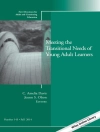This edited volume brings together innovative research in the field of Science Education, fostering scientific citizenship in an uncertain world. The nineteen chapters presented in this book address diverse topics, and research approaches carried out in various contexts and settings worldwide, contributing to improving and updating knowledge on science education. The book consists of selected high-quality studies presented at the 14th European Science Education Research Association (ESERA) Conference, held online (due to the Covid-19 pandemic) by the University of Minho, Portugal, between August 30th and September 3rd, 2021. Being of great relevance in contemporary science education, this book stimulates reflection on different approaches to enhance a deeper understanding of how better prepare the coming generations, which is of great interest to science education researchers and science teachers.
Table des matières
Chapter1. Unpredictability and Uncertainty … How can science education inspire young people to act for citizenship.- Chapter2. Learning and becoming in movement – a conceptual lens to research in science education, committed to fostering scientific citizenship in an uncertain world.- Chapter3. Looking toward the future: learning from investigations with newly hired science teachers.- Chapter4. Teaching nature of science through stories based on the history of the balance of nature idea: insights from the first cycle of a developmental study.- Chapter5. A Content Analysis of the Representation of The Nature of Science in A Turkish Science Textbook.- Chapter6. Structure and measurement of system competence – promoting systems thinking using analogue and digital models.- Chapter7. Identifying performance levels of enacted pedagogical content knowledge in pre-service biology teachers’ lesson plans.- Chapter8. Oh, no – that’s Disgusting! Influence of disgust and different teaching methods on students’ State of Interest.- Chapter9. How suitable are explanation videos for the chemistry classroom? – analysing and evaluating an explanation video on metal bonding.- Chapter10. Context-based learning as a method for differentiated instruction in chemistry education.- Chapter11. Using fiction in physics’ laboratories to engage undergrad students.- Chapter12. Inquiry and argumentation practices enacted by early students in an inquiry cycle about gravity and air friction.- Chapter13. An approach to generating guidelines for designing scientific argumentation competence assessments.- Chapter14. Teachers’ use of explicit instruction when planning lessons to foster students’ scientific inquiry competencies.- Chapter15. Irish primary teachers’ perspectives on the challenges and positives of teaching science during the covid-19 crisis.- Chapter16. Virus-related knowledge in pandemic times – results from two cross-sectional studies in austria and implications for secondary education.- Chapter17. Inoculating adolescents against climate change misinformation.- Chapter 18. Two-eyed seeing and scientific holism in a new science|environment|health pedagogy.- Chapter 19. Coming together across differences: the uniting role of social justice in science education.
A propos de l’auteur
Graça S. Carvalho is a Full Professor at Minho University, Portugal. She has a MSc degree in Biology (Cambridge University, UK) and a MSc in Health Education and Health Promotion (King’s College London, UK), a Ph D degree in Biology (Aveiro University, Portugal) and the Aggregation title in the Health Education field (Minho University). She is a Research Centre on Child Studies (CIEC) member. She was awarded the honorary degree of ‘Doctor Honoris Causa’ (Lyon University, France) in 2017, and the ‘Women in Science’ award (Portuguese ‘Ciência Viva’) in 2019.
Ana Sofia Afonso (Ph D Reading, UK, 2005) is an Assistant Professor in Science Education and researcher at the Research Centre on Education, UMinho, Portugal. Her research lies primarily in the area of informal science education. She is also interested in science teacher development.
Zélia Anastácio (Ph D, 2007) is an Assistant Professor at the University of Minho. She teaches Human Biology and Health, Natural Sciences I, and Research Methods. She got her Ph D (co-tutorship) in Child Studies (Minho University, Portugal) and Didactics of Biology, Health and Environment (Lyon University, France). She is a Research Centre on Child Studies (CIEC) member and researches biology education, health promotion and education, and sexuality education.












